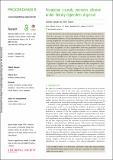Files in this item
Population viscosity promotes altruism under density-dependent dispersal
Item metadata
| dc.contributor.author | Kanwal, Jasmeen | |
| dc.contributor.author | Gardner, Andy | |
| dc.date.accessioned | 2022-03-09T16:48:26Z | |
| dc.date.available | 2022-03-09T16:48:26Z | |
| dc.date.issued | 2022-03-09 | |
| dc.identifier | 277724288 | |
| dc.identifier | 28d37661-6fba-4433-b5c3-054ffeb49b3a | |
| dc.identifier | 35259982 | |
| dc.identifier | 000766140800002 | |
| dc.identifier | 85126075896 | |
| dc.identifier.citation | Kanwal , J & Gardner , A 2022 , ' Population viscosity promotes altruism under density-dependent dispersal ' , Proceedings of the Royal Society of London Series B: Biological Sciences , vol. 289 , no. 1970 , 20212668 . https://doi.org/10.1098/rspb.2021.2668 | en |
| dc.identifier.issn | 0962-8452 | |
| dc.identifier.other | ORCID: /0000-0001-8306-3872/work/109766840 | |
| dc.identifier.uri | https://hdl.handle.net/10023/25017 | |
| dc.description | Funding: This work was supported by a Natural Environment Research Council Independent Research Fellowship (grant no. NE/K009524/1; AG) and a European Research Council Consolidator (grant no. 771387; AG and JK). | en |
| dc.description.abstract | A basic mechanism of kin selection is population viscosity, whereby individuals do not move far from their place of birth and hence tend to be surrounded by relatives. In such circumstances, even indiscriminate altruism among neighbours will often involve interactions between kin, which has a promoting effect on the evolution of altruism. This has the potential to explain altruistic behaviour across the whole tree of life, including in taxa for which recognition of kin is implausible. However, population viscosity may also intensify resource competition among kin, which has an inhibitory effect on altruism. Indeed, in the simplest scenario, in which individuals disperse with a fixed probability, these two effects have been shown to exactly cancel such that there is no net impact of viscosity on altruism. Here, we show that if individuals are able to disperse conditionally upon local density, they are favoured to do so, with more altruistic neighbourhoods exhibiting a higher rate of dispersal and concomitant relaxation of kin competition. Comparing across different populations or species, this leads to a negative correlation between overall levels of dispersal and altruism. We demonstrate both analytically and using individual-based simulations that population viscosity promotes the evolution of altruism under density-dependent dispersal. | |
| dc.format.extent | 8 | |
| dc.format.extent | 422629 | |
| dc.language.iso | eng | |
| dc.relation.ispartof | Proceedings of the Royal Society of London Series B: Biological Sciences | en |
| dc.rights | Copyright © 2022 The Authors. Open Access. Published by the Royal Society under the terms of the Creative Commons Attribution License http://creativecommons.org/licenses/by/4.0/, which permits unrestricted use, provided the original author and source are credited. | en |
| dc.subject | Constant non-disperser principle | en |
| dc.subject | Density-dependence | en |
| dc.subject | Inclusive fitness | en |
| dc.subject | Kin selection | en |
| dc.subject | Limited dispersal | en |
| dc.subject | Viscous population | en |
| dc.subject | QH301 Biology | en |
| dc.subject | DAS | en |
| dc.subject.lcc | QH301 | en |
| dc.title | Population viscosity promotes altruism under density-dependent dispersal | en |
| dc.type | Journal article | en |
| dc.contributor.sponsor | NERC | en |
| dc.contributor.sponsor | European Research Council | en |
| dc.contributor.institution | University of St Andrews.Centre for Biological Diversity | en |
| dc.contributor.institution | University of St Andrews.School of Biology | en |
| dc.contributor.institution | University of St Andrews.St Andrews Bioinformatics Unit | en |
| dc.identifier.doi | 10.1098/rspb.2021.2668 | |
| dc.description.status | Peer reviewed | en |
| dc.identifier.url | https://royalsocietypublishing.org/doi/suppl/10.1098/rspb.2021.2668 | en |
| dc.identifier.grantnumber | NE/K009524/1 | en |
| dc.identifier.grantnumber | 771387 | en |
This item appears in the following Collection(s)
Items in the St Andrews Research Repository are protected by copyright, with all rights reserved, unless otherwise indicated.

